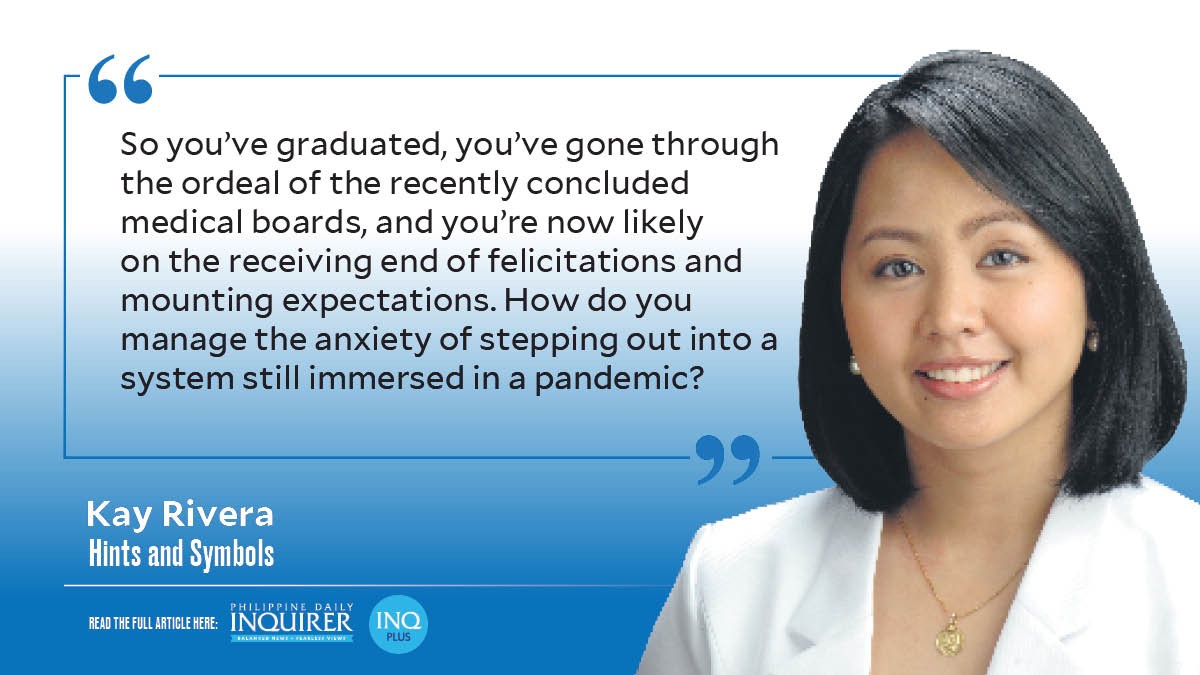Letter to a new doctor
So you’ve graduated, you’ve gone through the ordeal of the medical boards, and you’re now likely on the receiving end of felicitations and mounting expectations. How do you manage the anxiety of stepping into a system still immersed in a pandemic?
These are unsolicited musings from an older colleague young enough to still be in training, and old enough to have become jaded by the experience; not the most equipped to talk about the rigors of COVID-19 management, but hopefully immersed enough to have a little helpful perspective. You’ve spent a lot of time learning virtually, which is difficult and which robbed you of the small rewards that being with your classmates and mentors should offer. There’s a pervasive opinion among doctors that our newer colleagues have been shortchanged somehow, having spent less time in the hospital, with fewer duty hours and relatively limited hospital exposure. To a small extent, this may be true. Clinical experience is invaluable. Moreover, the pandemic not only enforced physical barriers, but put up the barrier of lessening the time we can spend with patients, if exposure is allowed: not for today’s trainees the leisurely chats with elderly patients, or easy playtime at the pediatric clinics.
Article continues after this advertisementI still think, though, that you are in a unique and valuable position as new doctors. During the pandemic, our circumstances throw into sharp relief — with great clarity and with high stakes — the terms of the social contract we’ve made through our profession: the moral imperative to serve, and what that means in a system that can be so ill-equipped for serving. You must brace against the impact of relentless moral injury (“Moral injury” 8/10/2020) — the endless number of soul wounds you will be dealt as a young doctor in the Philippines.
You will witness, if you haven’t already, how rain does not fall upon all of us equally.
The worst of COVID-19 always disproportionately affects the unemployed, the poor and those with poor access to health. (Seeing the price of tocilizumab is a kind of moral injury in itself.) In all of this, to avoid some feeling of self-blame is impossible. Most of us entered this profession out of some commitment to promote health, but the system is not built to support that, and we spend a lot of our careers reeling from this discrepancy. What are we doing wrong? Why aren’t we doing enough to help? You will feel this way whether you’re in the emergency room or wards as a frontliner, or on the sidelines in specialties less touched by the worst of COVID-19.
Article continues after this advertisementIn the Scientific American last year, one health care worker said of her experience in COVID-19 care: “Everyone in healthcare wants to do the right thing.” I was struck by that because unfortunately, as this pandemic has exposed, that’s not really true. The massive corruption we’ve witnessed, the way we’ve seen some in health agencies and in government profit from this pandemic, has put paid to that assumption.
You must not allow yourself to become corrupted, or for the ideals you created in med school to lose their shine. When the crisis is less acute, the ideals of young physicians will be what sustains the fight for change. I hope you don’t forget this dark time when it was clearer than ever that the sick Filipino must fend for himself; when frontliners were called heroes but sidelined in matters of health policy and still undercompensated; when health trainees were burdened as employees but given only stipends. When science should be at the forefront of all policy but set aside thanks to politics, greed and incompetence. When it is more apparent than ever that the health care system has long been fractured. I’m still hopeful that one day, we’ll live to see an overhaul.
Apart from facing the challenges unique to the pandemic, you’ll still be going through the bootcamp of medicine, with its rigorous schedules, petty tortures, and occasional rewards. The usual advice goes: admit mistakes; ask for help; have a to-do list; be an active listener; wear comfortable shoes; try not to screw over your colleagues. Most importantly, it’s imperative for new doctors to be proactive in prioritizing your own well-being. However strong we may feel at the outset, many of us find ourselves in the abyss with no recollection of how we got there. Look after yourself. Have some semblance of a self-care routine. It is advice that you will hear often enough for it to lose meaning, but it is the most important advice of all. You will soon realize that you will need to be proactive in caring for yourself, because the support system in medicine—understaffed, undercompensated, and unlearning decades of toxic behavior — is not always equipped to do that for you. Competence can be improved, and experience can be gained; but you will need to survive long enough to get there, and your soul must be healed and patched enough to sustain you.
















